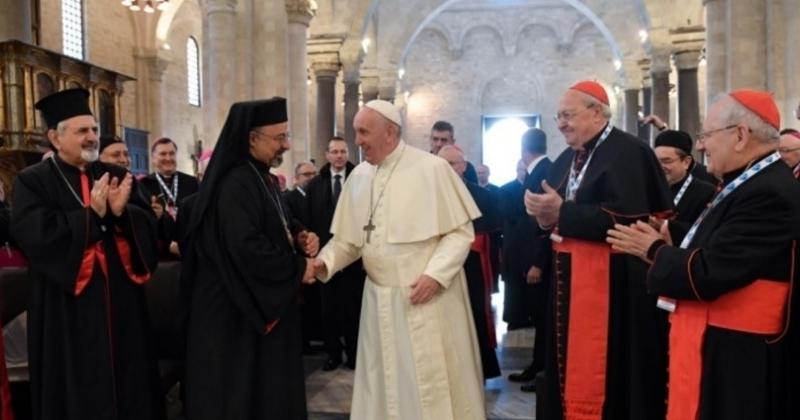In the face of hatred, fear, and division, Pope Francis called Sunday, February 23, on the Christian communities of the Mediterranean to recognise the inherent unity of the region’s multiculturalism.
In a message that acclaimed the beauty of diversity in the face of voices seeking to build walls — both literal and figurative — Francis February 23 concluded a five-day long conference in Bari, Italy, that sought to find new roads to peace and stability in the Mediterranean region.
Present day populism, Francis said, “reminds me of speeches that disseminated fear and hatred back in the thirties of the last century.”
At what has been called the Christian “G20”, representatives of Christian churches from twenty Mediterranean countries came together to find “solutions of peace” in the face of conflict and mass migration.
Catholic and Orthodox figures present at Bari stressed the importance of dialogue and mutual understanding, highlighting what many at the conference defined as the Mediterranean’s “intermingled” identity.
At Bari the historian and academic, Adriano Roccucci, said that the Mediterranean has “been hurt by too much conflict”, and that peace can only be obtained through “dialogue and friendship”.
“We must build bridges and reach across the walls of division and hatred,” said Roccucci.
To end the conference, Pope Francis met with the Christian representatives and celebrated mass in the Adriatic city on Sunday.
The churches of the region, Francis said, “need to develop a theology of acceptance and of dialogue leading to a renewed understanding and proclamation of the teaching of Scripture.”
The focus of the conference in Bari was of finding new ways forward in both seeking solutions to the Mediterranean’s conditions — one of conflict and mass migration, the cause of countless victims — and in fighting against the populist politics and rhetoric which only “address the problem by putting up walls”, said Francis.
The source of this new approach to the Mediterranean is to be found in its “rich” and “intermingled” identity, the Argentine pontiff stressed.
“The Mediterranean has a unique vocation,” Francis said, “the message of intermingling has much to tell us.”
“To be part of the Mediterranean region is a source of extraordinary potential: may we not allow a spirit of nationalism to spread the opposite view, namely, that those states less accessible and geographically more isolated should be privileged.”
One of the intellectual sources of the conference was the Florentine writer and mayor, Giorgio La Pira, who was an active figure in progressive Christian Democratic politics on the 1950s and 1960s.
La Pira, as was recounted by many delegates at the Bari conference, believed that in order to bypass conflict and secure peace and stability, the Mediterranean needed to affirm its unique identity.
During a meeting with the famed Egyptian president, Gamal Abdel Nasser, La Pira famously said “The Mediterranean can become, if it finds peace, the most luminous place on Earth.”
Finding ways to unpack and give light to this common, intermingled identity is what the Bari conference seeks to inaugurate.
One attendee that preferred to remain anonymous told Novena that what remains to be done is implement this vision, and to find ways to unpack and shed light on this common, shared identity.
And in order to achieve this, we have to define the Mediterranean in such a way that helps us.
The attendee pointed Novena to a definition by Fernand Braudel, French historian famed for his research on the Mediterranean:
“What is the Mediterranean? A thousand things in one. It’s not a landscape, but innumerable landscapes. It’s not a sea, but a succession of seas. It’s not a civilisation, but a series of civilisations stacked upon each other. Travelling in the Mediterranean means discovering the Roman world in Lebanon, prehistory in Sardinia, Greek cities in Sicily, the Arab presence in Spain, Islam in Yugoslavia.”
